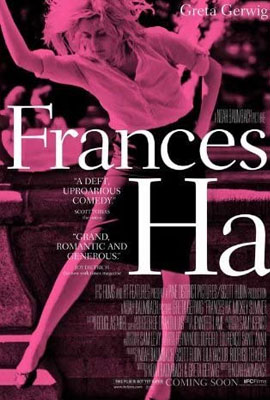
(2012)
directed by Noah Baumbach
Noah Baumbach, the director of “Frances Ha,” and Greta Gerwig, who stars as Frances in the film, wrote “Frances Ha” together. In real life, the two are a couple and are known to share a love of cinema. With its black and white cinematography and youthful attitude, “Frances Ha” gracefully acknowledges the French New Wave. Early in the film, there is a wonderful scene in which Frances runs several city blocks at breakneck speed. Sam Levy, the cinematographer, captures the energy of the city and the luminous beauty of Greta Gerwig in black and white images that thrill us with their pulsing energy.
Frances Handley is a twenty-seven year old woman trying to start a career in modern dance. Frances is tall, blonde, and has an appealing, wry sense of humor. She lives in a comfortable apartment in Brooklyn with her college friend, Sophie, who is a successful editor. Frances and Sophie act like college roommates. They are constantly joking around and playing all kinds of silly games.
The film is about that difficult stage in life between graduating from college and starting a career. Frances is an aspiring dancer in a dance company in which she hopes eventually to become a full member. Her life begins to unravel when she learns that her roommate, Sophie, is planning to move in with a friend who has a nicer apartment. There is no way Frances can afford their current apartment on her own, so she begins moving from one temporary address to another. Her latest address appears on the screen on a sound board each time she moves.
“Frances Ha” presents a succession of closely observed scenes which are both amusing and embarrassing. These scenes show Frances’ self-deception. She invents job interviews. She tells her helpful supervisor at the dance company that she has job prospects elsewhere. She spends Christmas at her parents putting up decorations, cooking, and generally pretending to have a normal life. On an impulse, she travels to Paris for a weekend but misses the friend she went to see and spends two days alone. She ends up totally broke. She returns to Vassar where she pours wine for visiting alumnae.
The film’s title, “Frances Ha,” is brilliant. It has an insouciant, self-deprecating quality that seems a perfect fit for the Frances we have come to know over the course of the film. Towards the end of the film, however, we learn that “Frances Ha” is actually all that is left of Frances’ name when her full name, Frances Handley, won’t fit on a piece of paper inserted into the panel beside the door of her latest address. The truncated name suggests that Frances is still incomplete.
“Frances Ha” is a brilliant portrait of a young woman struggling to find her footing in life. The black and white cinematography is gorgeous and Greta Gerwig is simply magnificent in the role of Frances. It is impossible to tear your eyes away from the screen! As Frances makes her way from one awkward moment to the next, I never doubted for a moment that she was a real person! Over the course of the movie, it is not too much of a stretch to say that I grew to love Frances!